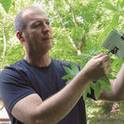Why some invasive plant species transmogrify from weak competitors at home to strong competitors abroad remains one of the most elusive questions in ecology. Some evidence suggests that disproportionately high densities of some invaders are due to the release of biochemicals that are novel, and therefore harmful, to naïve organisms in their new range. So far, such evidence has been restricted to the direct phytotoxic effects of plants on other plants. Here we found that one of North America's most aggressive invaders of undisturbed forest understories, Alliaria petiolata (garlic mustard) and a plant that inhibits mycorrhizal fungal mutualists of North American native plants, has far stronger inhibitory effects on mycorrhizas in invaded North American soils than on mycorrhizas in European soils where A. petiolata is native. This antifungal effect appears to be due to specific flavonoid fractions in A. petiolata extracts. Furthermore, we found that suppression of North American mycorrhizal fungi by A. petiolatacorresponds with severe inhibition of North American plant species that rely on these fungi, whereas congeneric European plants are weakly affected. These results indicate that phytochemicals, benign to resistant mycorrhizal symbionts in the home range, may be lethal to naïve native mutualists in the introduced range and indirectly suppress the plants that rely on them.
Available at: http://works.bepress.com/don-cipollini/87/
